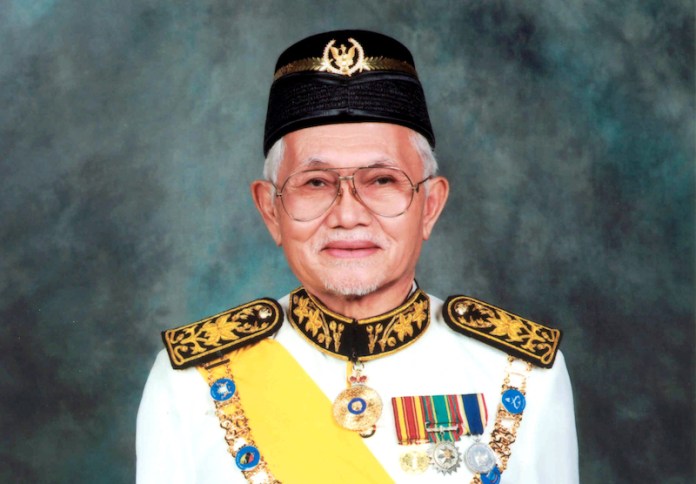
Sarawak Head of State (TYT) Tun Pehin Sri Abdul Taib Mahmud was born into an aristocratic family on May 21, 1936 in Sarawak’s northern town of Miri, Sarawak. This aristocratic background is matched by his academic and scholastic brilliance when he won a Colombo Plan Scholarship to study law in the University of Adelaide, Australia. Upon graduation, he brought back with him a barrister’s degree and a young, beautiful Australian wife of Turkish descent.
Sarawak, which just removed its shackles of British colonialisation, was an economic backwater.
Its longest road was a stretch of dirt road from Kuching outwards. It had no hotel in the capital worth speaking of. Its incidence of poverty soared up to over 70 per cent. The national income of Sarawak could not sustain a small western city for one week. Its schools were ramshackle and the children attended these schools barefooted.
Its 5,000 villages and longhouses were scattered all over the State with virtually no infrastructure – making the task of developing Sarawak a stupendous one, and almost impossible. Even the British could not fully develop Sarawak, although it had been under Brooke and British rule for over 100 years.
For the next 50 years, Taib dedicated and devoted his entire life to the development and welfare of the nation and the state of Sarawak. He was the youngest man ever to be sworn in as a state minister (at the age of 27) in the political history of Sarawak. He served as a federal minister in various ministries for 13 years and as chief minister of Sarawak for 33 years – a record of service to King and country unsurpassed anywhere in Malaysia.
As Chief Minister of Sarawak he changed the skyline of the State. The astronomical rise of development in Sarawak is neither accidental nor coincidental. It is a combination of brilliant policies and meticulous implementation.
The turning point of Sarawak’s history was on March 26, 1981. That was the day Taib was sworn in as the fourth Chief Minister of Sarawak.
At the time, Sarawak had at least 27 ethnic groups, all vying for a place in the developing State.
Political instability reigned supreme with members of political parties and state assemblymen leaving one group to join the other on a regular basis. It was subjected to political vicissitude, with no attempt to elevate its economic stagnation.
Malaysia was a young Federation which had teething problems and the relationship between Kuching and Kuala Lumpur was bumpy.
Taib being innovative and resourceful, introduced a new policy which became the envy of many – the Politics of Development.
Political infighting whether inter or intra was subordinated to economic development because the goal is no longer political fighting, but development and economic prosperity for the State. The winds of change began to blow, and for the first time efforts and energies in Sarawak were devoted to economic development.
Taib is not only a lawyer but an economist who studied economics in Harvard, the United States of America. Economics and finance are his forte, which former Deputy Chief Minister Datuk Patinggi Wong Soon Kai attests to, that planning is Tun Pehin Sri’s hallmark and one of his strong points.
His years as a federal minister gave him the edge over other Borneo leaders in his relationship with the central Government. By being able to convince and persuade, he was able to bring development to Sarawak. Soon, there were roads, bridges, electricity, water supply and so forth.
Following that, he introduced another policy, best expressed with the acronym – COME where the C means “change”, O “opportunity”, M “mobility” and E “equality”. Under the new policy, Sarawak went through even more dramatic and drastic change and transformation.
Taib was the chief minister who had set the tradition of high rural development budget where 60 per cent of the annual budget was allocated to the rural areas and 40 per cent, for the recurrent expenditure.
During the British colonial rule in 1954, Sarawak’s imports were valued at $130 million whilst exports were $125 million, giving it an adverse trade balance of $5 million.
Under Taib, by 2013, Sarawak’s budget had reached RM4.9 billion without taking into consideration of federal funds, and there was no external debt.
The financial rating by Mooney International and another international company Standard & Poor gave a consistent rating of 3A, which is comparable with the financial rating of Saudi Arabia and Petronas.
Understanding that education is the best leveller in an uneven playing field, he started to set up universities in Sarawak.
His former constituency in Samarahan was also converted into the educational hub of Sarawak, with the setting up of the acclaimed University Malaysia Sarawak (Unimas).
For rural development, he identified trigger points and assembled those in geographical proximity into critical mass so that basic facilities and infrastructure may be brought in.
On the political front, despite the existence of parties of diverse races and ideologies, he managed to deal with them wisely and tactfully, and there have yet to be incidents of bloodshed and hostile uprisings.
He was able to maintain Sarawak’s political stability for the three decades he helmed the State. — DayakDaily








